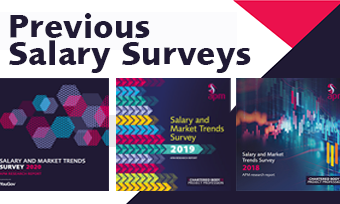
Future trends
Although project professionals are motivated by their own advancement and that of their organisations, they do not operate in a vacuum.
Understanding the underlying forces that will shape the future, and their place in it, is vital. 2021 is something of a perfect storm, with a global pandemic and political upheaval playing out against a backdrop of an urgent climate crisis.
In order to help us understand how the profession is facing up to these forces, we have looked in more detail at the issue of climate change: how it affects the work project professionals do, what mitigation measures they are pursuing and where they feel they need help. It’s early days but this research offers a vital window onto the progress so far and where we can do better.
There is much to be positive about here: organisations across almost all sectors are grasping the nettle of climate change and making real, substantive efforts to become part of the solution. Whether that’s through direct investment, improved education both within the organisation and outside or by rewarding better practice, it’s clear the commitment is there.
Interactive chart - make your selection to view the data and compare results
Key concerns for the future
No section of the economy has been left untouched by the pandemic, and there’s no question many in the profession fear its long-term impact. Almost two-thirds (64 per cent) recognise it as a challenge – and for just over one-fifth it is the most significant challenge (22 percent). Concern is higher among younger respondents than older: 72 per cent of those aged 18-to-24-years-old see it as a significant challenge compared with 55 percent of those aged 55-to-64-years-old.
Unsurprisingly, the concerns are most keenly felt in the sectors hit hardest so far, with project professionals in education, retail and transport all tracking above the average levels of concern. Beyond the pandemic, many fear that the upheaval caused by Brexit will present a significant challenge, with more than half (54 per cent)pinpointing its impact and those in manufacturing especially concerned (21 per cent believe it’s the number one challenge).
Naturally, the issue of climate change is also front of mind, but after several years of environmental issues climbing to the top of the agenda, the pandemic has grabbed much of the attention this year, with the numbers citing climate change as both a challenge and the most significant concern dropping (50 per cent to 43 per cent; 25 per cent to 14 per cent). However, this trend is likely to reverse, as 2021 will see a big push on this in the run-up to the United Nations Climate Change Conference (COP26) in November.
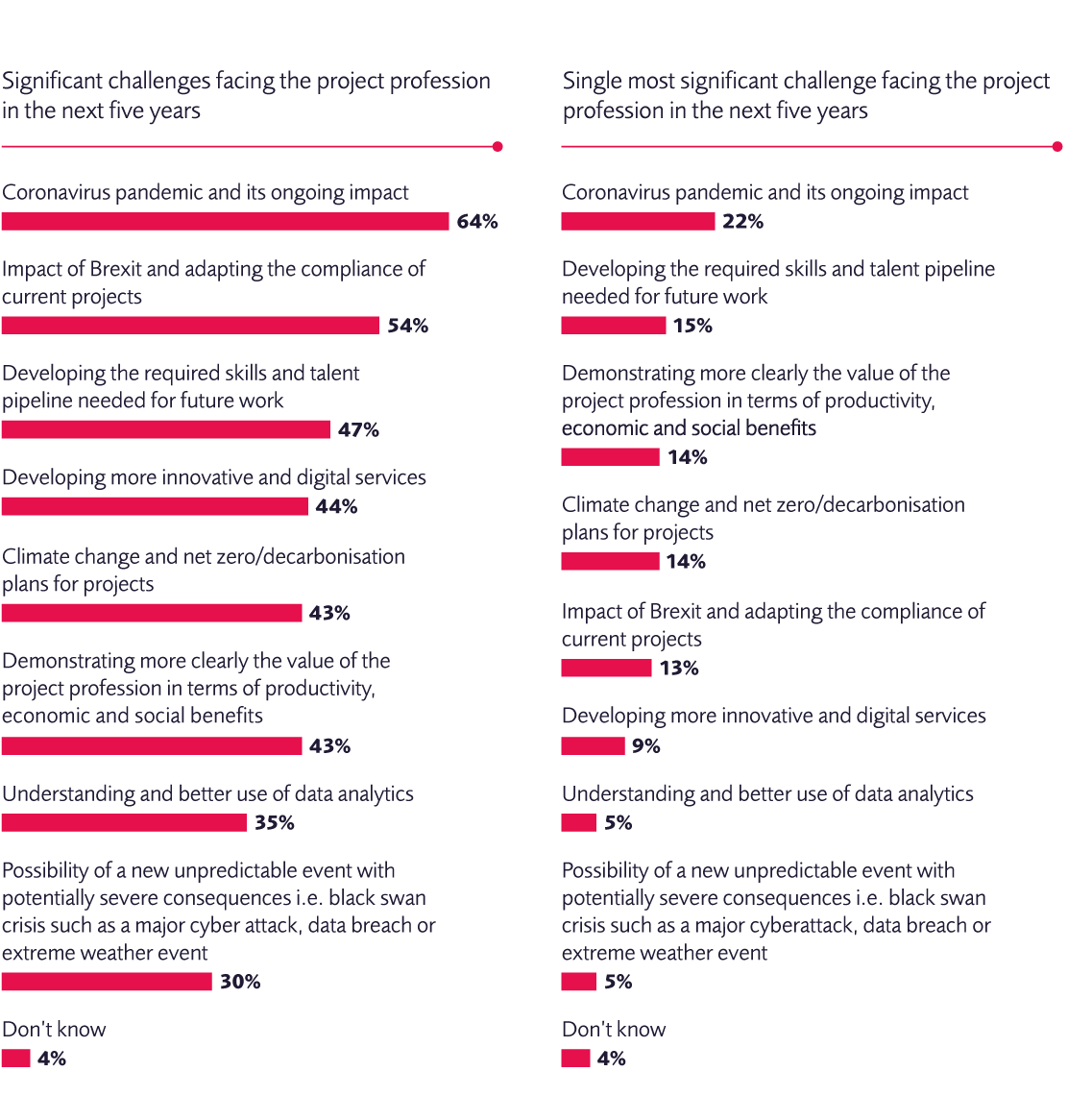
Future skills
Addressing these challenges will require a broad and varied skillset. Chief among these will be leadership –the ability to marshal resources to deliver on expectations in an environment where budgets are tight and uncertainty remains a constant. Fittingly, 29 per cent ranked it first, followed by people management and stakeholder engagement (26 per cent) and communication skills (16 per cent).
Men are more likely than women to rank project leadership first (33 per cent vs 24 per cent), while women are more likely to rank people management (30 per cent vs 24 per cent) or communication skills (18 per cent vs 14 per cent) as the most important.
It’s also worth noting that people management, while still critical, has seen its value diminish over the past year. While 37 per cent named it as the most valuable skill last year, that figure dropped to 26 per cent this time around.
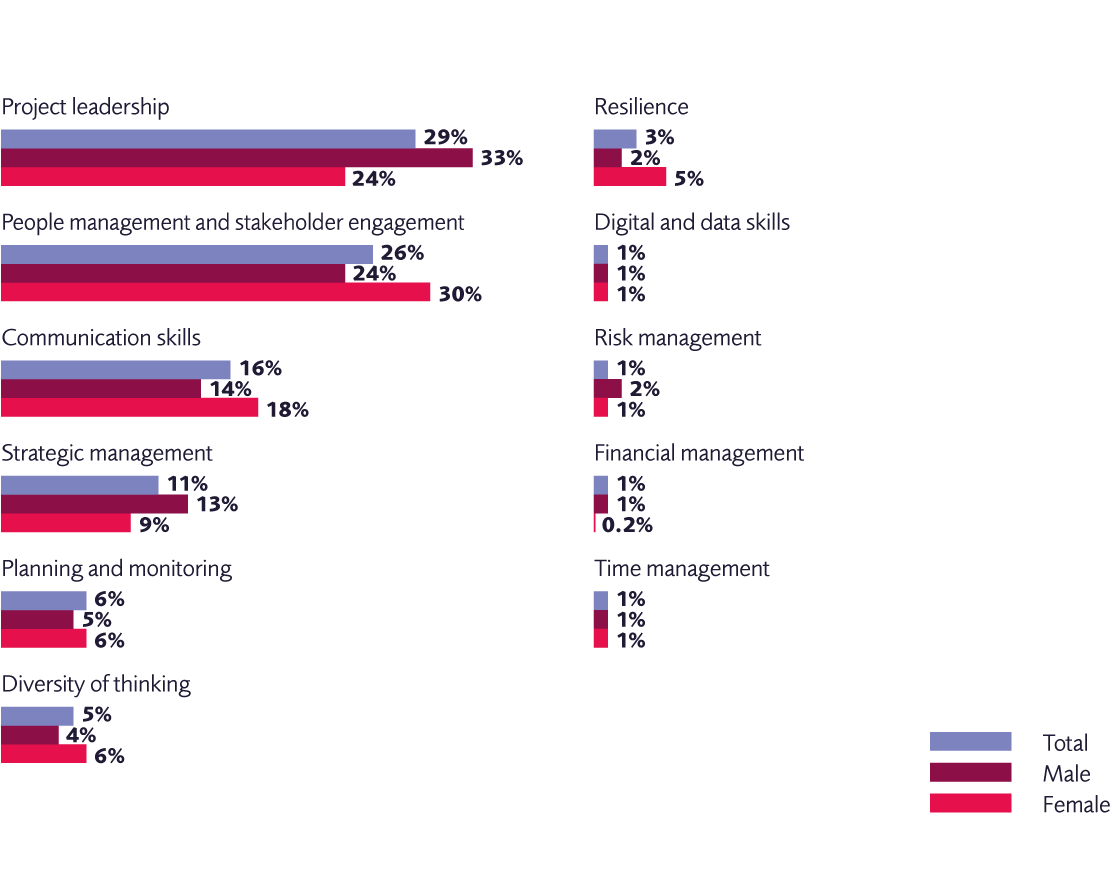
Climate change and net zero/decarbonisation strategy
The coronavirus pandemic will, hopefully, soon begin to recede in importance, albeit with lingering after-affects. But the need to address our relationship with the planet will remain urgent. Thankfully, there is growing evidence that project professionals are prepared to get involved in devising and delivering solutions.
More than half (55 per cent) say their organisation has a net zero strategy, and 36 per cent say that they consider themselves well equipped to tackle net zero challenges in their projects, which echoes general public polling. There are definite signs that some sectors are leading the way in tackling climate change or are achieving direct impact already.
There is of course a sectoral split, perhaps reflecting this differing pace of impact. The sector most likely to have a net zero strategy is energy and utilities (76 per cent), where 56 per cent say they are well equipped to tackle net zero challenges.
Similarly, 72 per cent of those working in transport and logistics have a net zero strategy, with 43 per cent well placed to tackle these challenges. Meanwhile, 71 per cent of respondents in local government say they have a net zero strategy, with 42 per cent confident of its effectiveness.

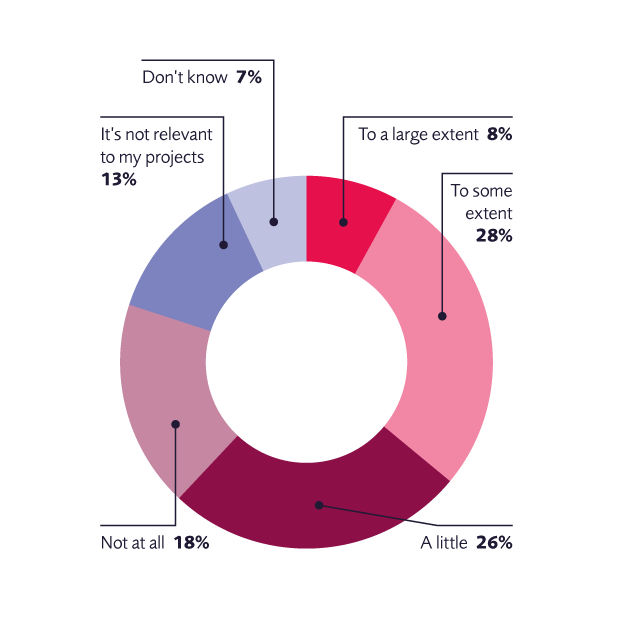
Equipped to tackle net zero challenges
Encouragingly, while there remains a wide range of knowledge and preparedness, only 13 per cent say they think climate change is not relevant to their project.
But of course, even the most committed and engaged project professional has barriers to overcome when embedding sustainability into their work and across the organisation. The results show where the profession feels the biggest challenges exist, with 36 per cent identifying competition from other priorities, 33 percent pointing to finance or investment restrictions and 27 per cent saying a lack of knowledge and awareness is holding back their efforts.
Tackling climate change
For those who are already on the journey, there are some clear trends emerging in terms of actions taken to minimise an organisation or project’s impact on the environment. Top of the list of measures is a focus on reducing resource waste (identified by 76 per cent of respondents), followed by measures to reduce resource use (75 per cent) and collaboration to reduce waste during project delivery (71 per cent).
What is perhaps most encouraging is the high scores across the board when it comes to the various mitigating measures that project professionals can use to address this urgent issue. Virtually every sector is either pursuing or pushing for more progress against climate change while all measures – from careful resource management to sharing knowledge and rewarding best practice – are seeing widespread adoption.
Naturally, education is central to capturing and driving improvement. And that is reflected in the appetite for a range of educational and knowledge sharing tools to improve the understanding of climate change. The most popular learning tools are webinars, events and/or peer-to-peer knowledge sharing (identified by 54 percent as helpful) and ‘bite-sized learning’ packages such as APM Learning (highlighted by 52 per cent).
It is also worth pointing out that while men are more likely than women to find specialist qualifications (24 per cent vs 20 per cent) and project accreditation (28 per cent vs 21 per cent) most useful, women are more likely to find ‘bite-sized learning’ (58 per cent vs 50 percent) and webinars useful (62 per cent vs 49 per cent).
In order to build on these findings, we are evaluating all learning resources to ensure we identify support and content in all areas.
Finally, there is a broad recognition that while educating professionals is useful, educating on climate issues should begin sooner, with almost nine in 10 (88 percent) of those surveyed believing climate change and sustainability education should be mandatory for the school curriculum and only seven per cent opposed.
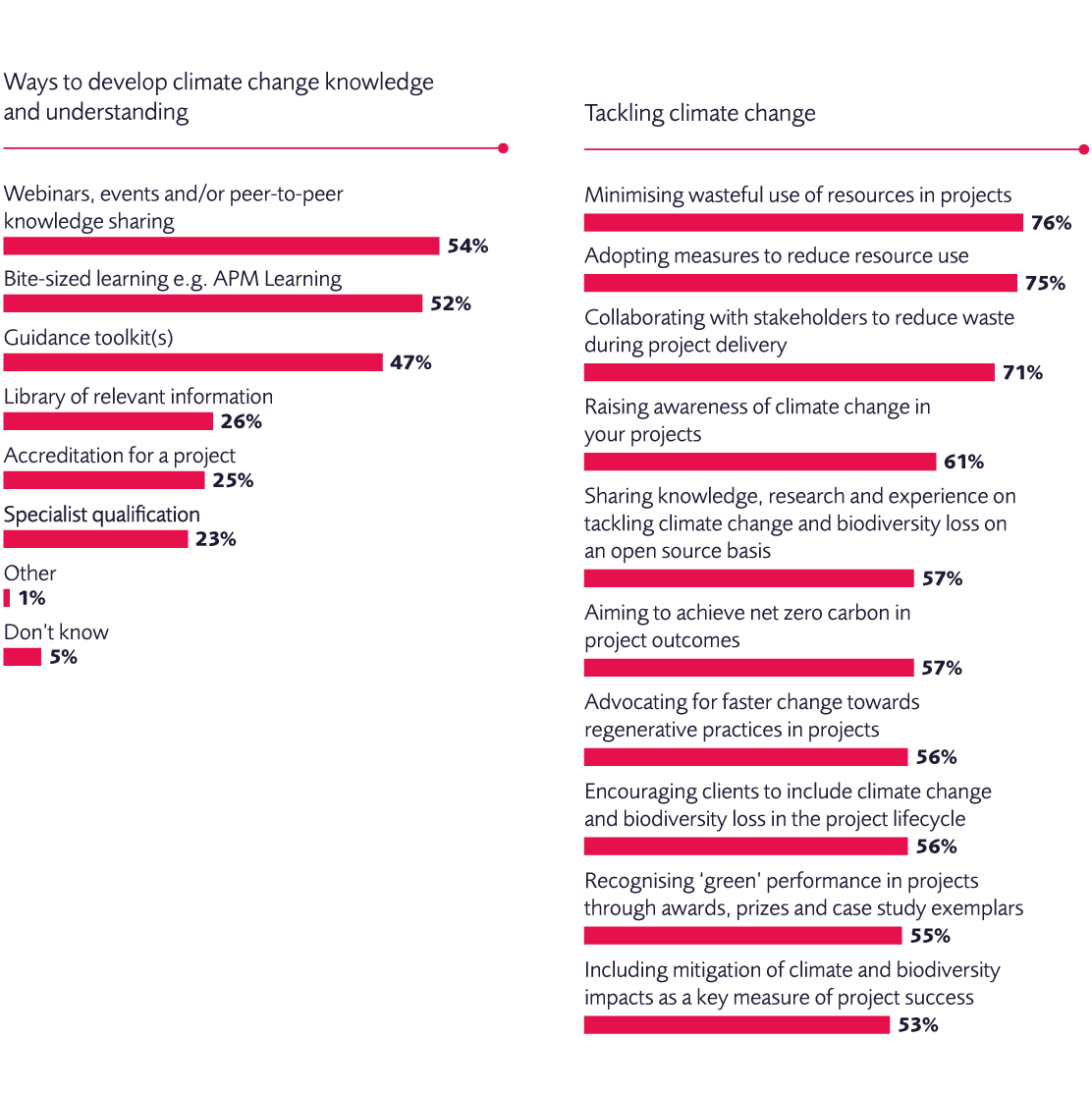
The project profession’s impact on society
When assessing the project profession’s impact on society, once again the results show that project professionals most value having a voice at the table when it comes to defining strategy. Thirty per cent believe that is the most important validation of the profession’s work, with 25 per cent stating that demonstrating evidence of the economic and social benefits of projects is also a good indicator of impact.
Looking beyond that, the important indicators that the project profession is having a positive impact on society remain in line with last year, although there do appear to be some splits down age lines. Influencing strategy is less important to younger professionals, who see economic benefits as more important (34 per cent vs 22 per cent).
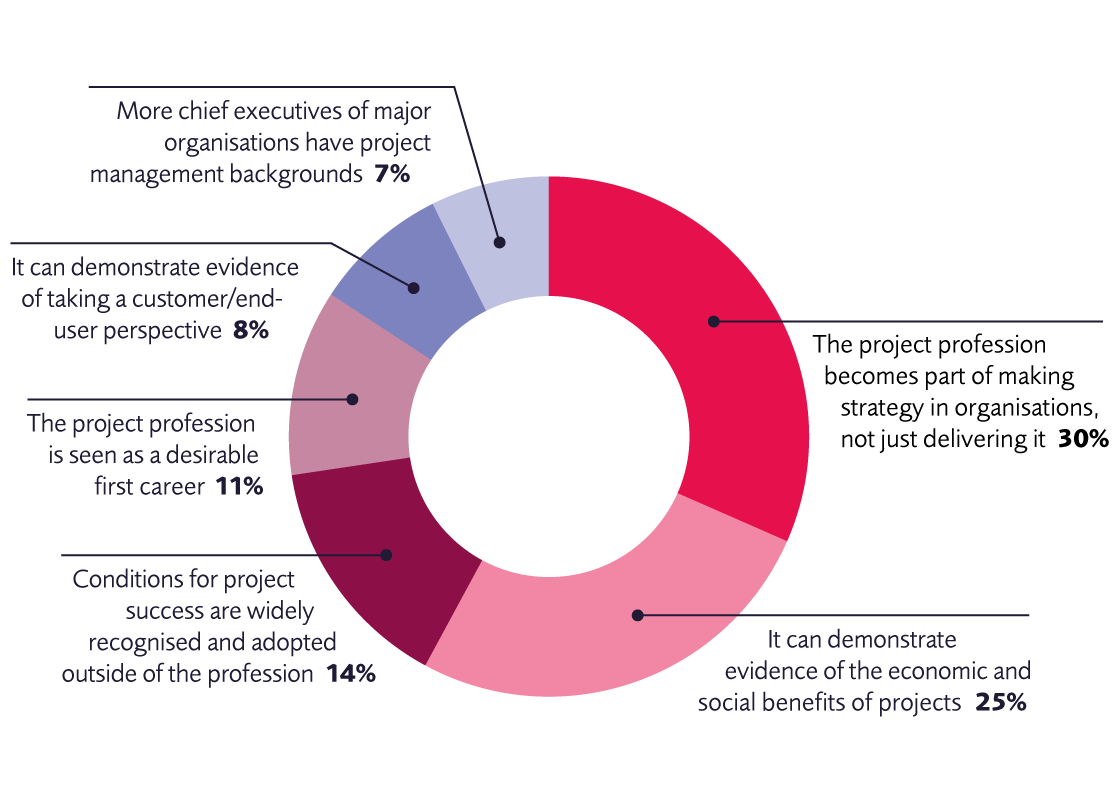
In summary: Rising to the challenge
For many in the profession, the past 12 months have represented the most challenging of their careers: work put on hold, uncertainty over employment prospects at current and future employers and concern over what comes next in the broader economy as the impact of the pandemic and Brexit are fully felt.
And certainly there is no sense that the profession is failing to engage with the pressing issues facing it. From economic uncertainty to changing working patterns, the drive to deliver more from less and the need to embed sustainability into every facet of their work, there’s no shortage of challenges.
But despite these, there is a clear sense that the profession as a whole will rise to them. A majority of respondents feel short-term difficulties will be overcome by a combination of long-term planning, investment in innovation and the application of core skills. Most also feel that the profession is well positioned to make a positive impact in the future by demonstrating leadership – both within projects and beyond.

Explore APM



